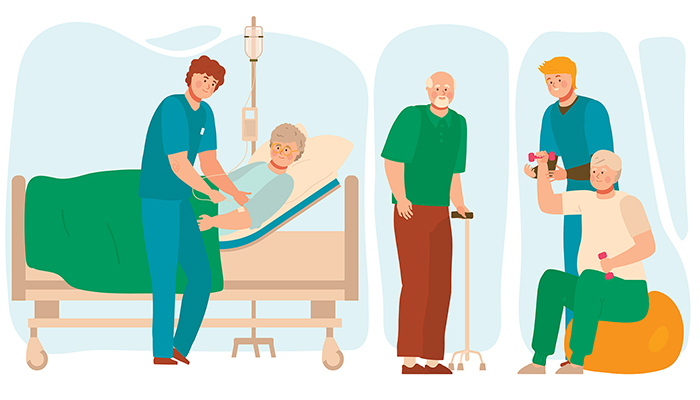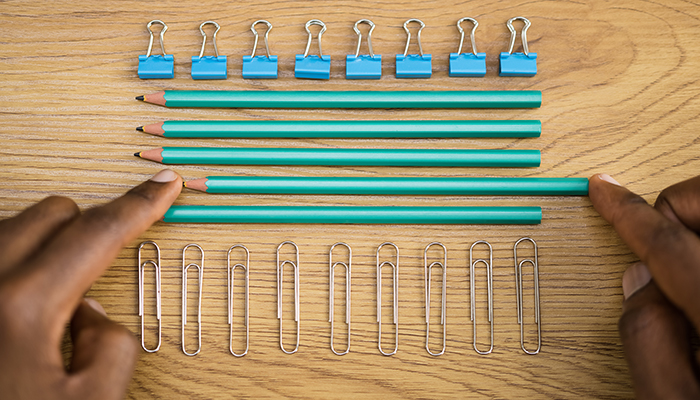Our Monthly Newsletter
with helpful tips for family caregivers
April/May 2023
Any chance that you might be a teensy-weensy bit of a perfectionist? Many family caregivers are. Check out our first article to learn alternate but still high-standard approaches that can help you avoid the serious pitfalls of perfectionism. In our middle article we address the problem of medication management and how you can leverage technology, especially automated pill dispensers, to reduce errors and increase the likelihood your loved one is getting their meds as directed. Our last article is for those with a relative in rehab or a nursing home. Did you know you have rights to attend meetings and be part of the care plan development? Medicare requires that the staff facilitate your participation. Your loved one’s also, if they are able.
Do you strive for perfection?
It’s important to do the best you can when caring for a loved one. But aiming for perfection can bring on problems. For yourself, in terms of anxiety, depression, and low self-esteem. And for your relative and other family members, who may feel burdened by living under the stress of constant measurement and judgment.
A desire to excel is completely honorable. But research shows that perfectionists actually get less done than other people. That’s because of black-and-white thinking. They see only the options of “complete success” or “complete failure.” That intense fear of failure results in an overfocus on details. What about gray? Maybe Mom did only some—not all—of her prescribed exercises today. That’s not failure; that’s a “good enough” day. If Dad snuck a shake of salt on his low-sodium diet, that’s not perfect, but it’s not failure, either.
Traits of a perfectionist. Do you recognize yourself in any of these?
- Unattainable goals. A perfectionist sets the bar unreasonably high. By contrast, greater success is achieved by starting with smaller goals and building from there.
- Outcome-oriented. A perfectionist focuses solely on the results, rarely the process. They live in fear of a flawed outcome. The alternative: Give it your best. Aim high, but also aim to enjoy the process.
- Judgment. Perfectionists look for flaws in their own achievements and those of others. And judge themselves harshly. Another approach is to honor what is accomplished, even if some goals fall short of ideal.
- Disappointment. A perfectionist is often disappointed. This frequently leads to depression. There is a more resilient option: Identify what worked and what didn’t and note what to do differently next time.
- Procrastination. Fear of failure can loom so large that perfectionists become paralyzed about moving forward. A success-oriented person understands that wins and losses are just a part of life. And you can’t win without daring to try.
If any of these traits feel familiar, don’t assume your standards are all wrong. (There’s that black-and-white thinking!) Consider broadening your focus to be success-oriented while appreciating the journey and the shades of gray between absolute perfection and absolute failure.
Return to topPillbox 2.0
 For many people, a pillbox is just the ticket. But as we age, we may take more medicines. Filling the box requires more concentration. Remembering to take the meds can become more challenging. Many families turn to technology to help an aging loved one.
For many people, a pillbox is just the ticket. But as we age, we may take more medicines. Filling the box requires more concentration. Remembering to take the meds can become more challenging. Many families turn to technology to help an aging loved one.
There are two tech strategies: Reminders issued by a phone, and automated dispensers.
Reminder apps. If your relative does fine setting up the pillbox, try a smartphone reminder app. These require a lot of inputting, however, and updating as medicines change. Quite honestly, setting standard smartphone alarms to go off at the appointed time is much simpler and serves roughly the same function.
Automated dispensers. Although they aren’t very portable, if your loved one has memory issues and five medications or more, consider an automated dispenser.
- Filling the device. Some are like a pillbox and require a person (you?) to put the pills in compartments for each day and time. Then the machine beeps and opens the right compartment when its dose is due. Others allow you to load each medication in bulk into separate containers. One for each drug needed. The machine fills the individual day/time compartments based on what you have programmed.
- Reminder strategy. Some flash lights or make noise. Others send a reminder alert to your relative’s smartphone. Or make an automated call. Do you want to also receive a reminder?
- Confirmation strategy. Some devices keep beeping or flashing until the compartment has been opened. You can also have a “compartment opened” text confirmation sent to you. (No guarantees the pills made it into the mouth, however!)
- Protection against overmedication. Some devices lock the compartment when detecting that a dose of pills has not been taken at the programmed time. Again, you may want an alert when a medication is not taken.
The care plan and meeting
 If your loved one is admitted to a skilled nursing facility, Medicare requires the staff develop an initial, personalized care plan within the first 48 hours. This describes who should be doing what. Then, within the first 14 days, the staff must assemble a comprehensive assessment, which must include your loved one’s needs and strengths. Also their goals of treatment, personal preferences, and a brief life history.
If your loved one is admitted to a skilled nursing facility, Medicare requires the staff develop an initial, personalized care plan within the first 48 hours. This describes who should be doing what. Then, within the first 14 days, the staff must assemble a comprehensive assessment, which must include your loved one’s needs and strengths. Also their goals of treatment, personal preferences, and a brief life history.
Then, within a week, a formal care plan meeting of all the care team members—including your relative if they are able—is required, to develop a durable roadmap for care based on the assessment. As your loved one’s representative, you have the right to be involved in the plan and meeting.
The care plan lays out what services are needed to support your loved one toward achievable physical, mental, and psychosocial well-being. For example, physical, speech, or occupational therapy sessions. And it identifies dietary guidelines and food preferences. Overall, the plan must tie into and support your loved one’s stated goals.
Here’s how you can help:
- Before the meeting. Ask your relative what’s going well and what’s not. What do they prefer would happen? Help prioritize their questions and requests.
- During the meeting. Help the staff understand how best to communicate and work with your loved one. Keep your relative’s goals and preferences at the forefront. You can ask questions or request changes if you don’t understand or don’t agree with staff recommendations. Take thorough notes. You also have a right to a written copy of the plan.
- After the meeting. Monitor how the care plan seems to be working and definitely talk to staff if questions arise.
Build bridges with a collaborative approach rather than a confrontational mindset. If this sounds daunting, give us a call at 847-868-1445. We can help advocate for your loved one’s wishes.
Return to top